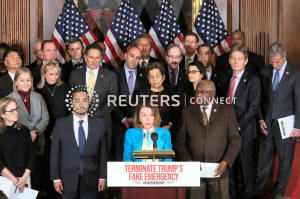|
House passes bill rejecting Trump's
border wall emergency
 Send a link to a friend
Send a link to a friend
 [February 27, 2019]
By Susan Cornwell and Richard Cowan [February 27, 2019]
By Susan Cornwell and Richard Cowan
WASHINGTON (Reuters) - In a stinging rebuke
to President Donald Trump, the House of Representatives on Tuesday
brushed aside veto threats and passed legislation to terminate the
emergency he declared at the U.S.-Mexico border in order to build a wall
there.
By a vote of 245-182, the House passed the resolution, setting up a vote
in the Republican-controlled Senate where the resolution's chances were
slimmer, but seemed to be improving.
While passage was a victory for Democratic House Speaker Nancy Pelosi,
the tally was short of what she would likely need to override a possible
veto by Republican Trump. Only 13 Republicans supported the move to stop
the president's declaration.
During floor debate, Democratic Representative Joaquin Castro, the main
sponsor of the controversial legislation, said, "There is no emergency
at the border," adding, "Border crossings are at a four-decades low."
Democrats and some Republicans worry that with the emergency declaration
unilaterally funding his border wall without lawmakers' approval, Trump
was presenting a dangerous challenge to the constitutional balance of
powers between Congress and the executive branch of government.

Hours before the House vote, Republican Senator John Barrasso, a member
of the Senate's leadership, told MSNBC in an interview that the
legislation "may actually pass the Senate."
Following a closed meeting of Republican senators and Vice President
Mike Pence, Senate Majority Leader Mitch McConnell refused to predict
the outcome, including whether senators ultimately could override a
Trump veto.
McConnell said Republican senators and Pence held a "robust, vigorous
discussion" and that he had not "reached a total conclusion" over
whether Trump's emergency proclamation was legal.
Meanwhile, the White House formally notified Congress, as expected, that
if the measure passes Congress, Trump's advisers would recommend that he
veto it in order to maintain the power he activated on Feb. 15 as a way
of circumventing Congress.
Trump argues he has the power to proclaim a national emergency to
unilaterally direct existing money for building a border wall that
Congress has refused to fully fund.
"The current situation at the southern border presents a humanitarian
and security crisis that threatens core national security interests and
constitutes a national emergency," the White House statement said.
A Trump veto would be the first of his presidency and the first since
Republicans lost majority control of the House in last November's
congressional elections.
Overriding such a veto in Congress would require two-thirds majorities
in both chambers, making it highly unlikely, said lawmakers.
The battle in Congress is the latest chapter in a long-running war
between Trump and Democrats over border security, immigration policy and
the "great, great wall" that Trump has pledged to build since becoming a
presidential candidate.

[to top of second column]
|

U.S. House Speaker Nancy Pelosi (D-CA), flanked by Representative
Joaquin Castro (D-TX) (L) and House Democrats hold a news conference
about their proposed resolution to terminate U.S. President Trump's
Emergency Declaration on the southern border with Mexico, at the
U.S. Capitol in Washington, U.S. February 25, 2019. REUTERS/Jonathan
Ernst

He originally promised that Mexico would pay for it, but after
Mexico refused, he asked U.S. taxpayers to foot the bill for a
project Democrats say is unneeded and will not be effective.
In his first two years in office, Trump's Republicans controlled
both chambers of Congress, which under the U.S. Constitution holds
the national purse strings.
During that time they failed to appropriate all the money Trump was
seeking to build a wall. This year, with Democrats in control of the
House, Congress refused Trump's demand for $5.7 billion in wall
funding. Instead, he got $1.37 billion for border barriers this
fiscal year.
Angry over that decision, Trump declared the emergency and vowed to
divert funds toward the wall from accounts already committed by
Congress for other purposes.
On a separate track from Congress, the future of Trump's emergency
declaration is also likely to be litigated in the courts.
A coalition of 16 U.S. states led by California has already sued
Trump and top members of his administration to block his emergency
declaration.
Writing on Twitter on Monday, Trump, who says the wall is needed to
stop illegal immigration and drugs, warned Republicans not to "fall
into the Democrats 'trap' of Open Borders and Crime!"
Republican Representative Justin Amash was the lone Republican
co-sponsoring the resolution in the House.
"The same congressional Republicans who joined me in blasting Pres.
Obama’s executive overreach now cry out for a king to usurp
legislative powers," Amash wrote on Twitter.
The White House was working to limit Republican support for the
measure, especially in the Senate.

Nevertheless, Republican Senator Thom Tillis, in an opinion article
published in the Washington Post, said he backed Trump on border
security, but would vote for the resolution because he "cannot
justify providing the executive with more ways to bypass Congress."
Republican Senator Lisa Murkowski on Tuesday told reporters she
would back the resolution. Previously, her Republican colleague,
Susan Collins had said she likely would support the measure, too.
For it to pass the Senate, at least one more Republican vote would
be needed, assuming all Democrats and two independents back it.
(Reporting by Susan Cornwell, Richard Cowan, Amanda Becker and Doina
Chiacu; editing by Jonathan Oatis and Grant McCool)
[© 2019 Thomson Reuters. All rights
reserved.]
Copyright 2019 Reuters. All rights reserved. This material may not be published,
broadcast, rewritten or redistributed.
Thompson Reuters is solely responsible for this content. |